Chu-Min Li
Integer Linear Programming Preprocessing for Maximum Satisfiability
Jun 06, 2025Abstract:The Maximum Satisfiability problem (MaxSAT) is a major optimization challenge with numerous practical applications. In recent MaxSAT evaluations, most MaxSAT solvers have adopted an ILP solver as part of their portfolios. This paper investigates the impact of Integer Linear Programming (ILP) preprocessing techniques on MaxSAT solving. Experimental results show that ILP preprocessing techniques help WMaxCDCL-OpenWbo1200, the winner of the MaxSAT evaluation 2024 in the unweighted track, solve 15 additional instances. Moreover, current state-of-the-art MaxSAT solvers heavily use an ILP solver in their portfolios, while our proposed approach reduces the need to call an ILP solver in a portfolio including WMaxCDCL or MaxCDCL.
Rethinking the Soft Conflict Pseudo Boolean Constraint on MaxSAT Local Search Solvers
Jan 19, 2024



Abstract:MaxSAT is an optimization version of the famous NP-complete Satisfiability problem (SAT). Algorithms for MaxSAT mainly include complete solvers and local search incomplete solvers. In many complete solvers, once a better solution is found, a Soft conflict Pseudo Boolean (SPB) constraint will be generated to enforce the algorithm to find better solutions. In many local search algorithms, clause weighting is a key technique for effectively guiding the search directions. In this paper, we propose to transfer the SPB constraint into the clause weighting system of the local search method, leading the algorithm to better solutions. We further propose an adaptive clause weighting strategy that breaks the tradition of using constant values to adjust clause weights. Based on the above methods, we propose a new local search algorithm called SPB-MaxSAT that provides new perspectives for clause weighting on MaxSAT local search solvers. Extensive experiments demonstrate the excellent performance of the proposed methods.
Incorporating Multi-armed Bandit with Local Search for MaxSAT
Nov 29, 2022Abstract:Partial MaxSAT (PMS) and Weighted PMS (WPMS) are two practical generalizations of the MaxSAT problem. In this paper, we propose a local search algorithm for these problems, called BandHS, which applies two multi-armed bandits to guide the search directions when escaping local optima. One bandit is combined with all the soft clauses to help the algorithm select to satisfy appropriate soft clauses, and the other bandit with all the literals in hard clauses to help the algorithm select appropriate literals to satisfy the hard clauses. These two bandits can improve the algorithm's search ability in both feasible and infeasible solution spaces. We further propose an initialization method for (W)PMS that prioritizes both unit and binary clauses when producing the initial solutions. Extensive experiments demonstrate the excellent performance and generalization capability of our proposed methods, that greatly boost the state-of-the-art local search algorithm, SATLike3.0, and the state-of-the-art SAT-based incomplete solver, NuWLS-c.
Hybrid Learning with New Value Function for the Maximum Common Subgraph Problem
Aug 18, 2022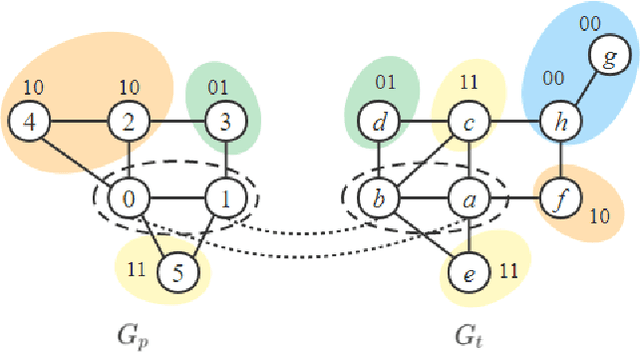
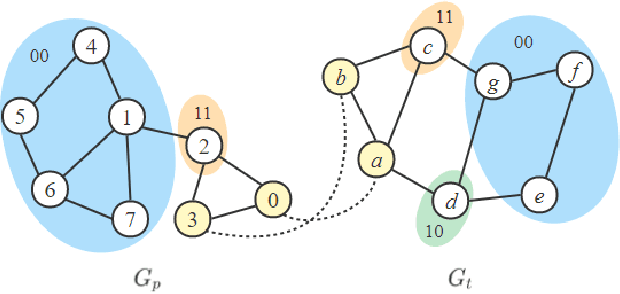
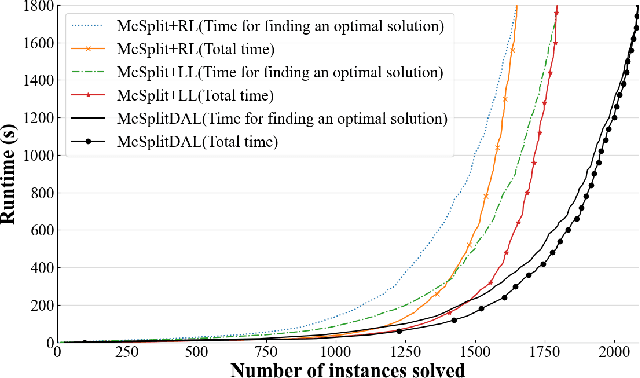
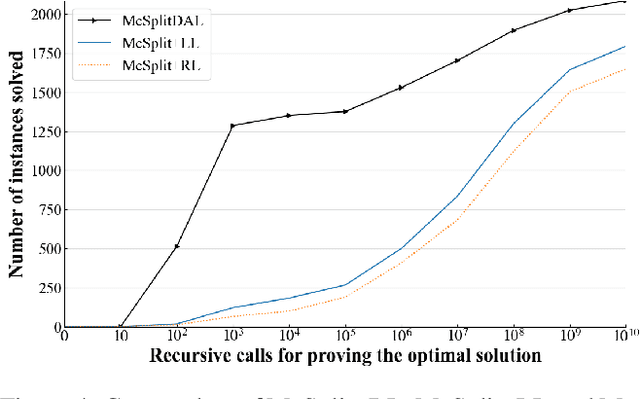
Abstract:Maximum Common induced Subgraph (MCS) is an important NP-hard problem with wide real-world applications. Branch-and-Bound (BnB) is the basis of a class of efficient algorithms for MCS, consisting in successively selecting vertices to match and pruning when it is discovered that a solution better than the best solution found so far does not exist. The method of selecting the vertices to match is essential for the performance of BnB. In this paper, we propose a new value function and a hybrid selection strategy used in reinforcement learning to define a new vertex selection method, and propose a new BnB algorithm, called McSplitDAL, for MCS. Extensive experiments show that McSplitDAL significantly improves the current best BnB algorithms, McSplit+LL and McSplit+RL. An empirical analysis is also performed to illustrate why the new value function and the hybrid selection strategy are effective.
Reinforced Lin-Kernighan-Helsgaun Algorithms for the Traveling Salesman Problems
Jul 15, 2022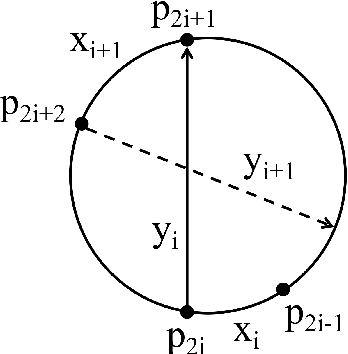


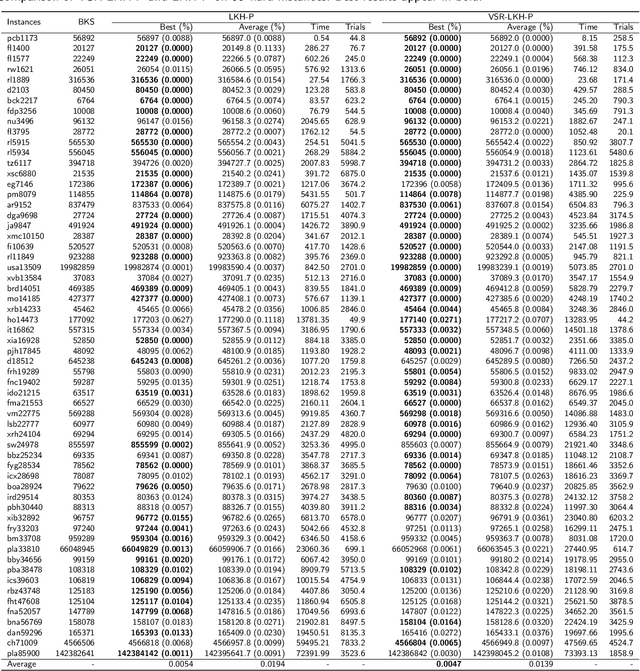
Abstract:TSP is a classical NP-hard combinatorial optimization problem with many practical variants. LKH is one of the state-of-the-art local search algorithms for the TSP. LKH-3 is a powerful extension of LKH that can solve many TSP variants. Both LKH and LKH-3 associate a candidate set to each city to improve the efficiency, and have two different methods, $\alpha$-measure and POPMUSIC, to decide the candidate sets. In this work, we first propose a Variable Strategy Reinforced LKH (VSR-LKH) algorithm, which incorporates three reinforcement learning methods (Q-learning, Sarsa, Monte Carlo) with LKH, for the TSP. We further propose a new algorithm called VSR-LKH-3 that combines the variable strategy reinforcement learning method with LKH-3 for typical TSP variants, including the TSP with time windows (TSPTW) and Colored TSP (CTSP). The proposed algorithms replace the inflexible traversal operations in LKH and LKH-3 and let the algorithms learn to make a choice at each search step by reinforcement learning. Both LKH and LKH-3, with either $\alpha$-measure or POPMUSIC, can be significantly improved by our methods. Extensive experiments on 236 widely-used TSP benchmarks with up to 85,900 cities demonstrate the excellent performance of VSR-LKH. VSR-LKH-3 also significantly outperforms the state-of-the-art heuristics for TSPTW and CTSP.
Branching Strategy Selection Approach Based on Vivification Ratio
Dec 11, 2021
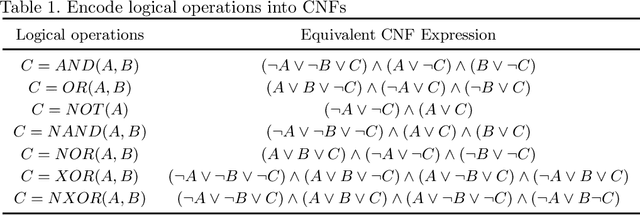
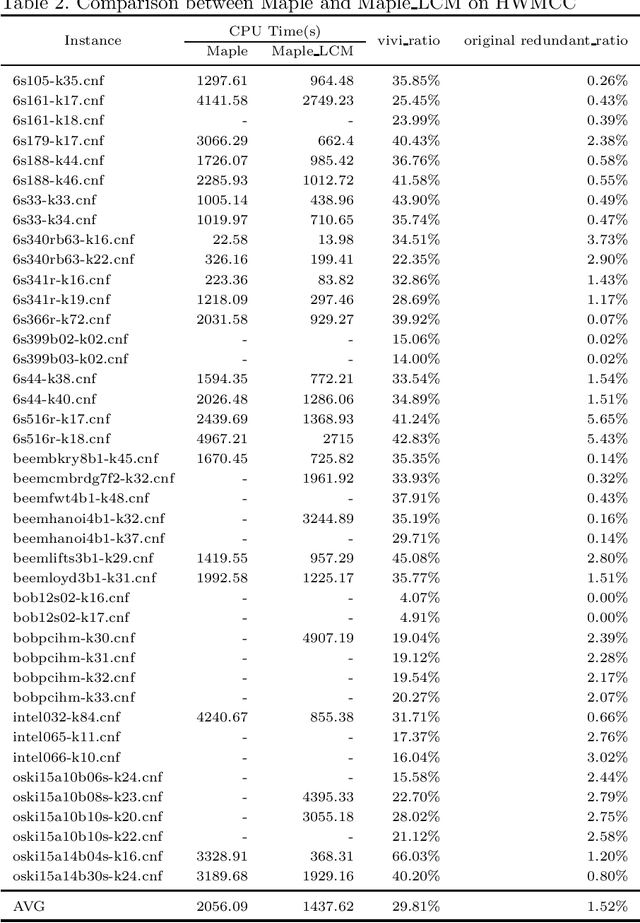
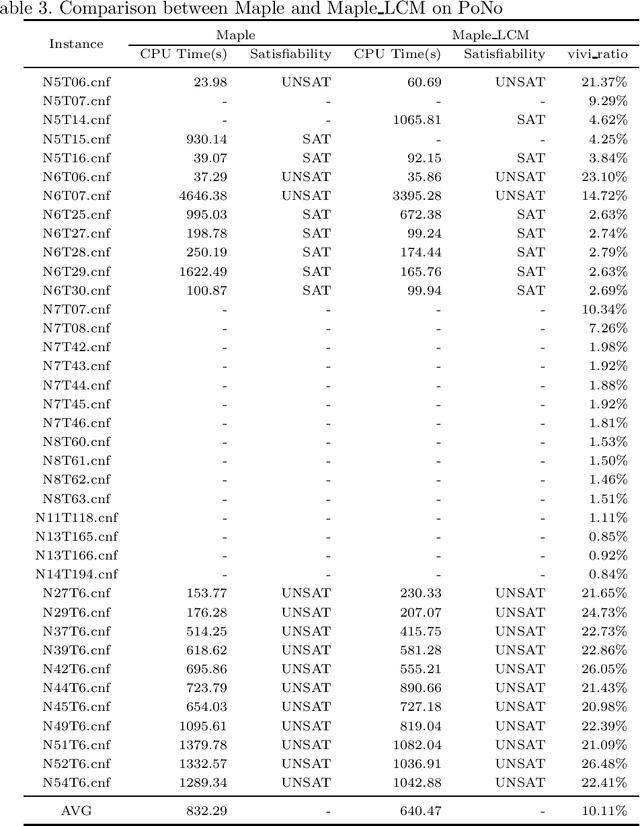
Abstract:The two most effective branching strategies LRB and VSIDS perform differently on different types of instances. Generally, LRB is more effective on crafted instances, while VSIDS is more effective on application ones. However, distinguishing the types of instances is difficult. To overcome this drawback, we propose a branching strategy selection approach based on the vivification ratio. This approach uses the LRB branching strategy more to solve the instances with a very low vivification ratio. We tested the instances from the main track of SAT competitions in recent years. The results show that the proposed approach is robust and it significantly increases the number of solved instances. It is worth mentioning that, with the help of our approach, the solver Maple\_CM can solve more than 16 instances for the benchmark from the 2020 SAT competition.
An Iterative Path-Breaking Approach with Mutation and Restart Strategies for the MAX-SAT Problem
Aug 10, 2018



Abstract:Although Path-Relinking is an effective local search method for many combinatorial optimization problems, its application is not straightforward in solving the MAX-SAT, an optimization variant of the satisfiability problem (SAT) that has many real-world applications and has gained more and more attention in academy and industry. Indeed, it was not used in any recent competitive MAX-SAT algorithms in our knowledge. In this paper, we propose a new local search algorithm called IPBMR for the MAX-SAT, that remedies the drawbacks of the Path-Relinking method by using a careful combination of three components: a new strategy named Path-Breaking to avoid unpromising regions of the search space when generating trajectories between two elite solutions; a weak and a strong mutation strategies, together with restarts, to diversify the search; and stochastic path generating steps to avoid premature local optimum solutions. We then present experimental results to show that IPBMR outperforms two of the best state-of-the-art MAX-SAT solvers, and an empirical investigation to identify and explain the effect of the three components in IPBMR.
Clause Vivification by Unit Propagation in CDCL SAT Solvers
Jul 29, 2018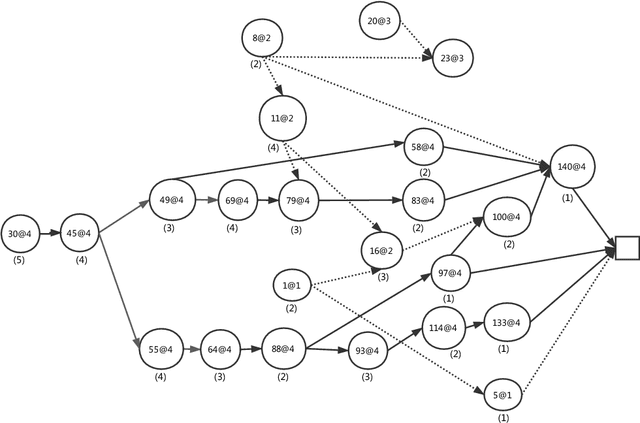
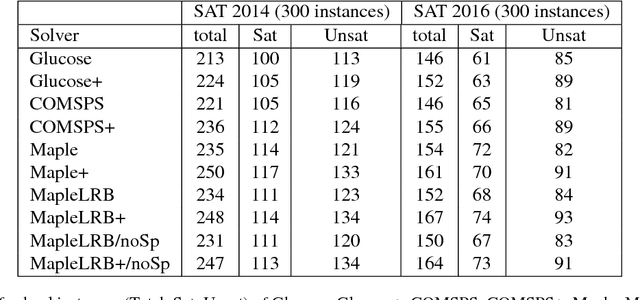
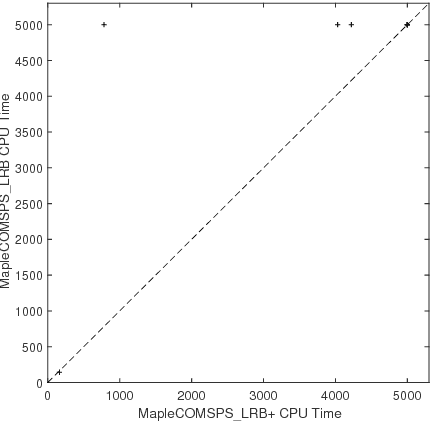
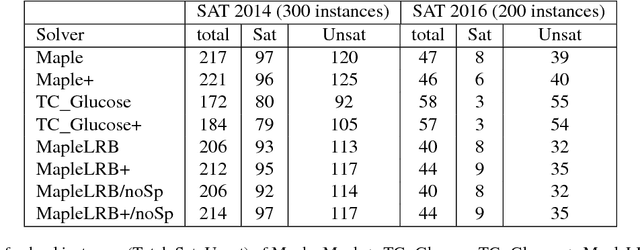
Abstract:Original and learnt clauses in Conflict-Driven Clause Learning (CDCL) SAT solvers often contain redundant literals. This may have a negative impact on performance because redundant literals may deteriorate both the effectiveness of Boolean constraint propagation and the quality of subsequent learnt clauses. To overcome this drawback, we propose a clause vivification approach that eliminates redundant literals by applying unit propagation. The proposed clause vivification is activated before the SAT solver triggers some selected restarts, and only affects a subset of original and learnt clauses, which are considered to be more relevant according to metrics like the literal block distance (LBD). Moreover, we conducted an empirical investigation with instances coming from the hard combinatorial and application categories of recent SAT competitions. The results show that a remarkable number of additional instances are solved when the proposed approach is incorporated into five of the best performing CDCL SAT solvers (Glucose, TC_Glucose, COMiniSatPS, MapleCOMSPS and MapleCOMSPS_LRB). More importantly, the empirical investigation includes an in-depth analysis of the effectiveness of clause vivification. It is worth mentioning that one of the SAT solvers described here was ranked first in the main track of SAT Competition 2017 thanks to the incorporation of the proposed clause vivification. That solver was further improved in this paper and won the bronze medal in the main track of SAT Competition 2018.
 Add to Chrome
Add to Chrome Add to Firefox
Add to Firefox Add to Edge
Add to Edge